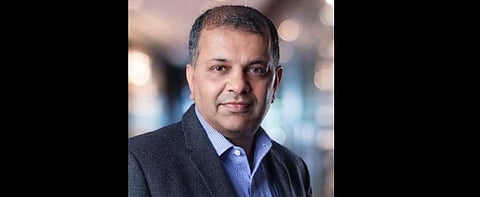
- LIFESTYLE
- FASHION
- FOOD
- ENTERTAINMENT
- EVENTS
- CULTURE
- VIDEOS
- WEB STORIES
- GALLERIES
- GADGETS
- CAR & BIKE
- SOCIETY
- TRAVEL
- NORTH EAST
- INDULGE CONNECT

Writer Suketu Mehta is angry. Angry about border policies, the portrayal of immigrants and at the state of global politics. “My new book is an angry book. I felt I had to write it now because there is such an enormous campaign against immigrants,” the author tells us in an interview from New York, where he resides. Titled This Land is Our Land: An Immigrant’s Manifesto, the non-fiction book makes a fervent and heartfelt case for immigration. Through facts, statistics and human stories, interwoven with personal narrative, Mehta’s book is a bit of a departure from his previous bestseller, Maximum City. In this interview with Indulge, he tells us about his reasons for writing, what idealism means to the world, and how climate change will affect us more than we realise.
Lines in the sand
The time, Mehta says, was just right to bring out the book. “There is a huge backlash against immigration. And a portrayal of immigrants around the world, whether it‘s Bangladeshis in India, Mexicans in the US or Arabs in France, is of robbers, rapists and terrorists. When the reality is that immigrants overwhelmingly benefit the country that they move to,” Mehta, who himself was born in Kolkata but is now an Ameican citizen, asserts. The author descends from a long line of merchants and travellers, who over the years have called India, the UK, and Kenya, their homes.
The core of this book can be summed up by an incident Mehta narrates in the opening pages. In the 1980s his grandfather was sitting on a park bench in London and was questioned by a British man about being in “his” country. His grandfather retorts, “You took all our wealth, our diamonds. Now we have come to collect.” It is this thought that drives the book. “The reasons that immigrants have had to move to in the first place, is because the rich countries stole the future of poor countries through colonialism, through war and through climate change,” he adds. Mehta explains further that climate change will result in land that is home to millions of people becoming a desert and land that is home to thousands of people going underwater, by the middle of this century. “Where are all these people going to go? We can’t just let billions of people die and starve. They’ll have to move and the countries of the world will have to figure it out. That is going to require coordinated global action,” he states.
So what can be done? The best way to deal with climate change is to make borders much more open, more porous so there is free flow of goods, capital and people, he replies with hope. And if that sounds too idealistic, Mehta proclaims, “People who called for the end of slavery were also called idealists. People who called for the fair treatment of the Dalits, the founding fathers of India, were all idealists. You have to start somewhere. So yes, my book is an angry book, but it is an angry book with a happy ending.”
Once upon a time in Mumbai
The impact of Mehta’s 2004 Maximum City, the narrative non-fiction novel, has been so huge that the title itself has become a familiar synonym for the city. Bursting with colourful anecdotes and vignettes of everyone from gangsters to bar dancers, the book seems like it would be perfect for the screen. When nudged to reveal more about that, Mehta does admit that there is someone working on a screenplay and
fans can expect some news about it soon.
But the next book that Mehta is working on is an ode to his current home town, New York. “There are a bunch of chapters about the different worlds of New York such as, the police, politics, immigrants and Coney Island. And what interweaves it, is my story, of having lived here since 2014,” says the author who has also written screenplays for movies such as Mission Kashmir and New York, I Love You. So does he still consider himself a ‘Bombay boy’? “Oh yes, very much so. Being a ‘Bombay boy’ also means that you can be a New York boy or a London boy or a Rio de Janeiro boy. The thing with Mumbai is that it is expansive enough that it does not ask for an exclusive alliance. It need not be a monogamous marriage,” he signs off.
anagha@newindianexpress.com
@anaghzzz